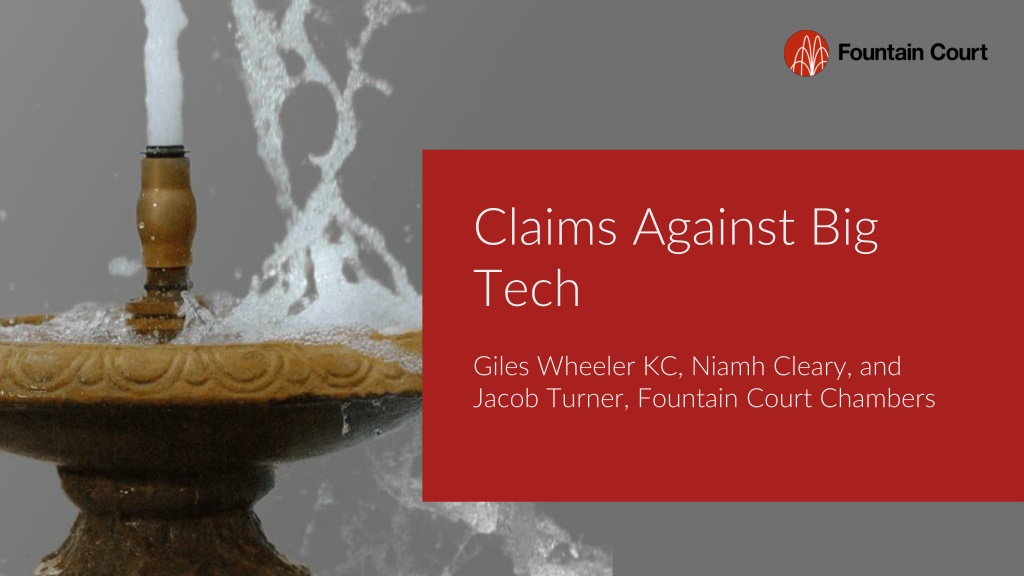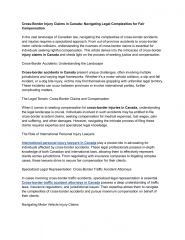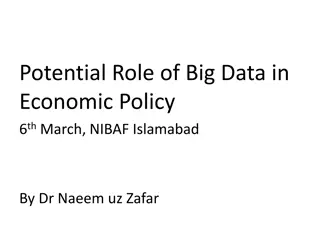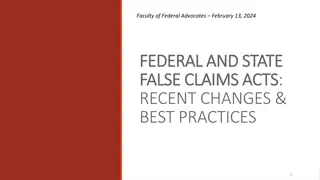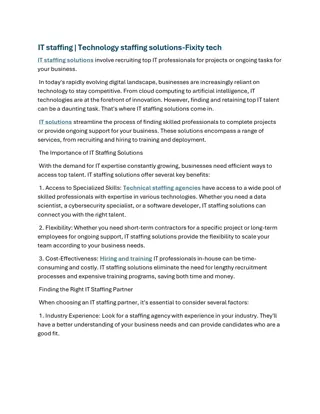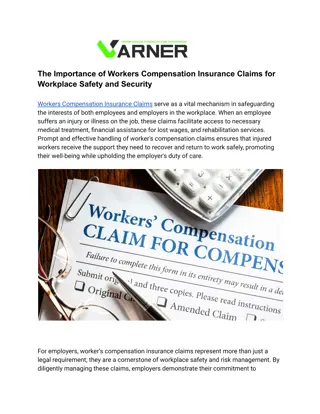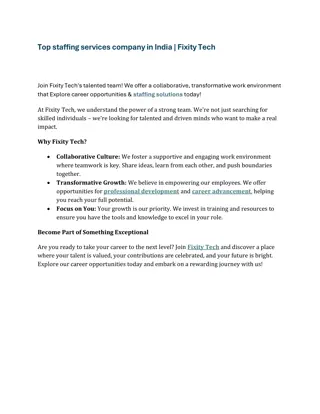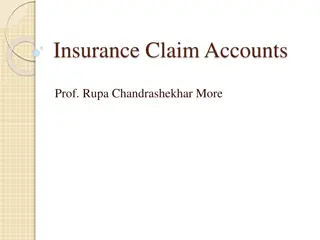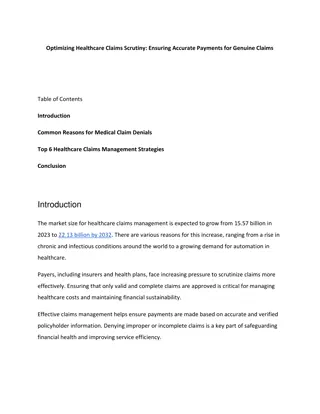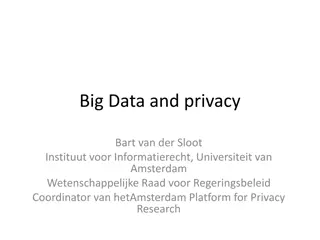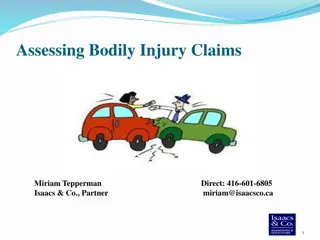Challenges and Opportunities in Big Tech Claims: A Comprehensive Overview
Explore the complexities surrounding class actions and representative claims against Big Tech companies, including recent cases and the rise of collective proceedings. Delve into key topics such as algorithmic decision-making, CPO processes, and the landscape post-Merricks, shedding light on the renewed focus by enforcement agencies and methodologies for assessing damages effectively.
Download Presentation

Please find below an Image/Link to download the presentation.
The content on the website is provided AS IS for your information and personal use only. It may not be sold, licensed, or shared on other websites without obtaining consent from the author. Download presentation by click this link. If you encounter any issues during the download, it is possible that the publisher has removed the file from their server.
E N D
Presentation Transcript
Claims Against Big Tech Giles Wheeler KC, Niamh Cleary, and Jacob Turner, Fountain Court Chambers
Topics covered in this seminar Class actions and representative claims against Big Tech AI litigation: Drivers v Uber and Ola Cabs cases The ICO s new focus on algorithmic decision-making and implications for private claimants The Rohingya Facebook Claim
Class actions and representative claims: an overview Representative claims: Governed by CPR 19.6 Representative claimant must have the same interest as those on whose behalf the claim is being brought Google LLC v Lloyd [2021] UKSC 50
Class actions and representative claims: an overview Collective proceedings Governed by s.47B of the Competition Act 1998 Proceedings can be opt-out or opt-in
Class actions and representative claims: an overview Threshold requirements for certification under s.47B: Just and reasonable to appoint the class representative Claims raise the same, similar, or related issues of fact or law Methodology for assessing damages on a class wide basis that is sufficiently credible or plausible to establish some basis in fact for the commonality requirement : London & South Eastern Railway Ltd v Gutmann [2022] EWCA Civ 1077
The class action landscape post Merricks Merricks v Mastercard [2020] UKSC 51 8 (at least) new class actions issued against Big Tech in 2021-2022 2 against Apple 3 against Google 1 against Meta 1 against Qualcomm 1 against Sony
Why is the CPO process so popular in Big Tech claims? Renewed focus by competition enforcement agencies on tech giants (i.e., Meta, Google, and related industries) Features of the CPO process favourable to mass claims against tech giants
Looking forward: conceptual and practical problems Conceptual: new markets and problems of market definition Practical Carriage disputes Overlapping claims Is there a risk of the pendulum swinging back?
Defining AI Traditional Programs AI Programs Autonomous Non-deterministic Non-linear Transparency/ explainability difficult Automated Deterministic Logic based Explanations can be provided easily
Defining AI European Commission AI Act Draft of 25 November 2022 Art. 3 (1) artificial intelligence system (AI system) means a system that is designed to operate with elements of autonomy and that, based on machine and/or human-provided data and inputs, infers how to achieve a given set of objectives using machine learning and/or logic- and knowledge based approaches, and produces system- generated outputs such as content (generative AI systems), predictions, recommendations or environments with which the AI system interacts; decisions, influencing the
Drivers v Uber BV and Ola Cabs BV Notification to Drivers
Source: https://eng.uber.com/advanced-technologies-detecting-preventing-fraud-uber/
GDPR Right to an explanation Articles 13(2)(f), 14(2)(g) and 15(1)(h) GDPR require data controller to: provide the data subject with the following further information necessary to ensure fair and transparent processing: the existence of automated decision-making, including profiling and, at least in those cases, meaningful information about the logic involved, as well as the significance and the envisaged consequences of such processing for the data subject. Recital 71: In any case, such processing should be subject to suitable safeguards, which should include specific information to the data subject and the right to obtain human intervention, to express his or her point of view, to obtain an explanation of the decision reached after such assessment and to challenge the decision.
Right not to be subject to automated decision-making Article 22 GDPR: 1. The data subject shall have the right not to be subject to a decision based solely on automated processing, including profiling, which produces legal effects concerning him or her or similarly significantly affects him or her. 2. Paragraph 1 shall not apply if the decision: (a) is necessary for entering into, or performance of, a contract between the data subject and a data controller; (b) is authorised by Union or Member State law to which the controller is subject and which also lays down suitable measures to safeguard the data subject's rights and freedoms and legitimate interests; or (c) is based on the data subject's explicit consent.
The first instance judgments Court rejects companies attempt to rely on security concerns to block disclosure of meaningful information on fraud detection systems Drivers succeed under Article 15 information request against Ola: Ola must provide [the drivers] with information that makes the choices made, data used and assumptions on the basis of which the automated decision is taken transparent and verifiable. Ola must communicate the main assessment criteria and their role in the automated decision to [the drivers], so that they can understand the criteria on the basis of which the decisions were taken and they are able to check the correctness and lawfulness of the data processing Uber persuades court that decisions on fraud detection are not taken solely by AI, because human moderators check and verify the results
ICOs Focus on Algorithms 3-year plan released in July 2022 Focus includes: o looking at the use of algorithms within the benefits system; o considering the impact the use AI in recruitment could be having on neurodiverse people or ethnic minorities, who weren t part of the testing for this software; Deputy Commissioner, Stephen Bonner (October 2022): As it stands, we are yet to see any emotion AI technology develop in a way that satisfies data protection requirements, and have more general questions about proportionality, fairness and transparency in this area. Powers to constrain AI use may be reduced in UK by new Data Protection and Digital Information Bill
Rohingya Google Claim A novel duty of care? Tension between the traditional view of social media platforms and Meta s use of algorithms
London Singapore Fountain Court Chambers Fountain Court, Temple, London, EC4Y 9DH T +44 (0)20 7583 3335 Fountain Court Chambers 10 Collyer Quay, Ocean Financial Centre #40-38, Singapore 049315 T 65 6808 6611 www.fountaincourt.co.uk
